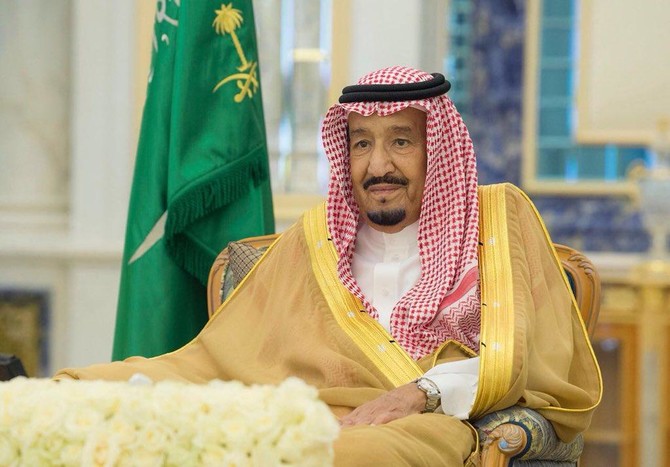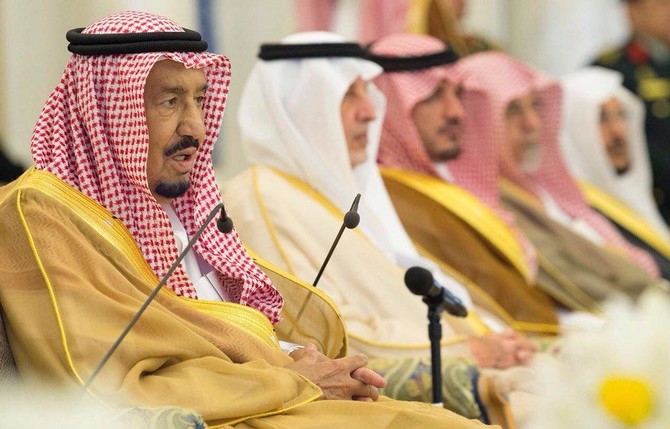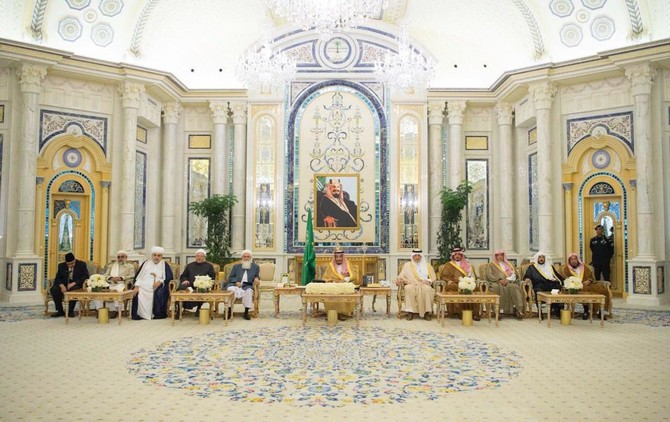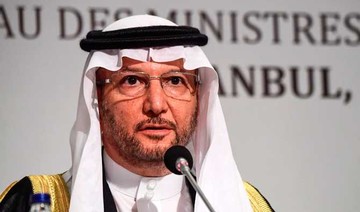MAKKAH: King Salman received a delegation of Muslim scholars participating in the International Ulema Conference on Peace and Security in Afghanistan, at Al-Salam Palace in Jeddah on Wednesday.
King Salman commended the scholars’ efforts and those of the Organization of Islamic Cooperation (OIC) in holding the conference.
“No one is more eligible then you to serve Islam and Muslims, unite their words, reunify them, and eradicate wars and crises, and the scourges of extremism and terrorism from the Islamic world,” he said.
“We feel today very optimistic that your efforts will contribute to opening a new page in Afghanistan, to achieve the aspirations of the Afghan people of security and stability. This requires dialogue, reconciliation and tolerance as dictated by our Islamic religion,” King Salman said.
OIC Secretary-General Dr. Yousef bin Ahmed Al-Othaimeen said: “More than 100 Muslim scholars from around the world have gathered for the sake of this ancient Islamic country, which has suffered and is still suffering from the scourge of war, murder, terrorism and division, to evoke the concept of reconciliation in Islam and to come up with a united stance to address the fallout of the Afghan crisis.”
Al-Othaimeen said that the conference provided a platform for scholars to discuss the crisis from a legitimate perspective to achieve security, peace and reconciliation between the various parts of Afghan society through dialogue, transcending wounds and renouncing all forms of violence, extremism and terrorism incompatible with Islamic religion.
“The conference will end by unanimously adopting the Makkah Declaration on the consolidation of peace and stability in Afghanistan, a solution emanating from the teachings of Islam and its people,” he said.
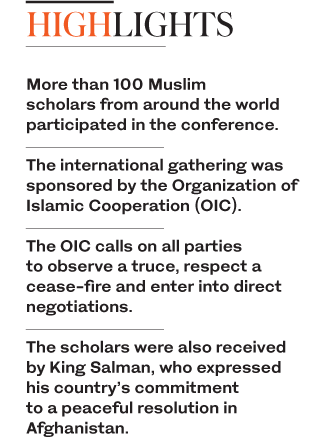 He underlined King Salman’s drive to unify ranks, establish peace and achieve security and peace in the Islamic world and in Afghanistan in particular.
He underlined King Salman’s drive to unify ranks, establish peace and achieve security and peace in the Islamic world and in Afghanistan in particular.
“This is reflected through his support for the truce reached during the Eid Al-Fitr and his appeal to the parties to respond to the call for truce and extend it to stop shedding the blood of innocents and paving the way for a peaceful dialogue,” he said.
Meanwhile, the two-day conference concluded in Makkah with Muslim scholars outlawing the killing of innocent people.
The final declaration stressed that what was happening in Afghanistan was contrary to the principles and formal teachings of Islam.
“The solution to the cause of the Muslim Afghani must particularly go through mutual understanding and direct peaceful negotiations,” read the closing declaration.
Al-Othaimeen said: “We hereby call on Muslim states, organizations and elites to join efforts and pull their weight toward the establishment of peace and security in Afghanistan, using all their potential and influence toward this goal to ensure a peaceful and decent life where Muslims cooperate toward developing their nation in harmony.”
“We affirm that the suicide attacks targeting innocent people, and internecine killings among Muslims, are all acts that are prohibited by Allah and His Messenger under texts that are conclusively clear and well-established, whereby Allah says ‘And whoever kills a believer intentionally, his punishment is hell; he shall abide in it, and Allah will send His wrath on him and curse him and prepare for him a painful chastisement.”
“We endorse and support the efforts of the Afghani scholars toward a successful Afghani reconciliation. We pay tribute to the efforts by the President of the Islamic Republic of Afghanistan, Dr. Mohamed Ashraf Ghani, and praise him for his invitation to the Taliban Movement to engage in a direct, peaceful and unconditional dialogue, and for his recognition of the Movement as a political party whose goal shall be the predominance of security in Afghanistan,” he said.
Muslims scholars called on the Taliban Movement to respond to the invitation by the Afghanistan government to abstain from violence, end the mutual killings and sit together around the negotiating table.
Abdullah Al-Tayer, chief adviser to the OIC, told Arab News that the conference was based on a recommendation by the Council of Foreign Ministers in the Islamic countries, and the declaration would be forwarded to them to discuss during their meeting in the UAE. “The council will then submit the declaration and its recommendations to the Islamic summit to decide what will be next,” he said.
Sayed Jalal Karim, Afghan ambassador to Saudi Arabia, told Arab News that the declaration was balanced, calling on all parties to bear responsibility.


